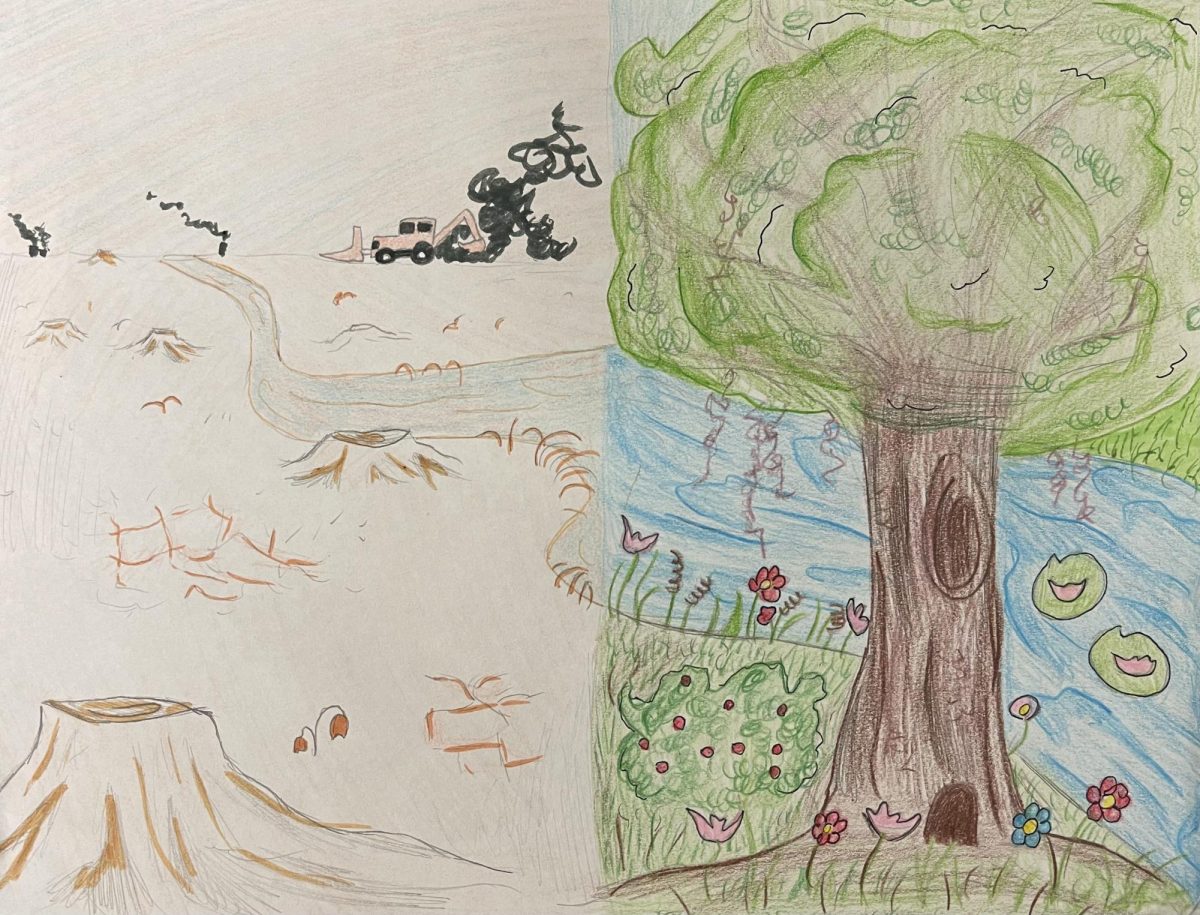Today––in this society, we are constantly managed by factors which are out of our control. School and work are essentially ingrained into our way of life, our being. And no one ever questions it, the logistics of all of it. We take for granted what is right in front of us—blinded by what society deems as normal. Nobody could ever have a seamless life, that’s true. Humanity designed a world where we could be as sheltered and secure as possible, with little work effort. However, humanity is still largely dependent on, well, humanity. No one could ever have an easy life doing nothing. And I understand that. I get the fact that we need to be productive, doing things that we need to do to survive. “Need to do” I say… but only based on unmanageable outside factors, and those factors alone. It makes sense that there needs to be some order in society, though I always wonder if there could be another solution—if we could change the necessity of school and work. These factors were not God-given necessities. We put those necessities on ourselves. We don’t know how much these necessities are affecting us, because we don’t live in a world where these necessities aren’t necessities. We see these things as productive because that’s what we made them out to be. But how are we ever sure that there is a better way to this system if we never alter it? For hours at a time, many places in the world require us to unavoidably spend a chunk of our childhoods in a classroom five days of the week. For over twelve years, in fact. Everything you learn during these twelve years are meant to teach, no, discipline you in order to prepare you for a job that will undoubtedly not include most of the things you had learned. And you will soon find yourself in what seems like an entirely new world; one filled with excessive payments and responsibilities, completely devoid of the countless lessons taught at school at the expense of your years in youth. Although many of the higher-ups and parents never seem to question it, the majority of students and well-aware adults consistently doubt this social norm we were forced into.
Rules of obedience are already set-in-stone the moment you are born in the form of laws. Laws control essentially everything in your life, and as a normal individual, you have nearly no say in what laws are passed. Many of us think of laws as simply another part of this “system of life,” though we don’t really know the gravity of just how much it dominates the things we do. These laws, while simply restating morals most of us follow by default, have much power in our lives. Some laws, however, can be against our morals; ones that limit our humanitarian prerogatives. What if such laws prevented the right to wear a certain kind of clothing, to buy products which may seem too political, to practice any religion, or even to travel anywhere outside your country? A life like that would surely prove difficult for the usual person, or perhaps bothersome. And yet, we live in a reality where these things are, in fact, actual laws. They have such an effect on certain societies that they completely alter these peoples’ mental images of “life.” They don’t really know what it’s like to have free will because, well, that’s just a foreign idea to them. Not only to them, but to all of us.
Almost every habitable and sustainable area in the world resides some form of human life, including the laws that govern these areas. The law is applicable to any region controlled by a higher power, and we simply need to accept the fact that we can never avoid them unless we entirely devoid ourselves of human pleasures. But no normal person has the will or desire to do so. We simply have to obey laws—we have to hope that they do not control our lives enough that we become spiteful of them… though some of us already are. And we cannot alter them in any way, as we are fully dependent on the higher-ups to decide what and what not to accept. These higher-ups, in regard to any country, are seemingly playing around with our lives, determining what laws work on us and what laws don’t. It’s as if we are being brainwashed into accepting that this life of overwork and stress due to a variety of laws is simply normal. Parents, especially, have fallen into the pit-hole of the typical stickler, telling their children that education and good-paying jobs are most valuable. But that’s what the authorities of the country want them to think. If these parents took a moment to step into the shoes of their offspring, they will realize the absurdity of a system in which many people believe to be faulty. Teenagers, as flawed as they may be, have a gift of awareness in the world that most adults fail to realize. They can see past the imperfections of life more effectively than adults, most of whom seem to have this “near-sighted” mentality. I think of it as adolescents seeing the world through a unique lens, a lens unblinded by social norms. But those norms have shaped many adults’ minds into believing in a false image of what human success should look like. And it has worked so well that people don’t just accept this school/work system, they even essentially praise it for something I don’t quite understand. And governments are unwilling to change that prospect. It just saddens me that legislation, to an individual, is impossible to combat. We have no say in it.
At times, reverence in society is like a robot. A machine, programmed to do nothing else except follow the orders of another, is what they want us to be; people that simply do whatever anyone tells them to do, no matter what. While it would benefit the world if we ignored our needs for the aid of others, we have to take into account the fact that we’re only humans. Burn out and stress are human traits that cannot just be “set aside.” They are things that must be taken seriously, even if we do have to go against the views of a higher power, most of whom think otherwise. So, I’d say the norm should be prioritizing irreverence over reverence, because it seems we have no other choice but to do so if all reverence does is make us less of a human being. The “perfect” life people want us to have excludes all logic and reason; it doesn’t appear normal. People are practically encouraging a life lacking human urge, such as wanting to take a day off at risk of losing money, or forgetting to study for a test as you’re already swamped with a dozen other assignments you have to accomplish at the same time. These are normal human things frowned upon by more successful people, who put certain normalities on a podium and think of other normalities as inferior.
I imagine a world where we actually did do what others wanted us to do. It’d be a dry, dry place. At school, no one would be getting out of their seat, communicating with others, or speaking with the same high-pitched innocence in their voices. There would be no arguments, no “finding the best way” for anything. Everyone would have the same views, the same normalities, the same life. Everyone would be walking across the street devoid of the liveliness and diverse looks in their eyes, as clones of themselves would walk in apathetic strides along with them, all wearing plain suits and dresses and carrying ordinary suitcases. No one would complain about sickness, debt, hunger, exhaustion, stress, or depression. No one would question life, and no one would change it. No connections would be made nor strengthened.
In a way, there is a kind of grandness in disobedience. Humanity continuously being at odds with each other is what prevents this world from being entirely equal. How uninteresting the world would be, if everyone simply obeyed anything and everything the higher-ups force, and even suggest, them to do. But as governments continue to create more laws, and society continues to develop new norms, I believe we are getting closer and closer to that feeling of emptiness. And it seems that’s exactly what they desire––to create a life of boredom and… “progress.” But who’s here to change that if no one’s going to question it? Every week begins and ends the same. In the blink of an eye, it’s a Monday again; it feels like déjà vu to you, as the coming mediocrity of the week becomes outwardly apparent as soon as the 6 a.m. alarm begins to ring. Over and over again, we’re just repeating the same day that we can never change. We only periodically try to alter this routine to cope with the fact that it ceases to end. Unless you replace that uniformity in some way, you’ll find that an unfulfilling life is the only life left to experience. That is why, out of all things, the most important way to have success in your life is to find meaning in it––by meaning, I mean the things that you make an effort to accomplish outside of the societal norms which have put us in essentially requisite schedules. Without proper meaning, the years will continue to drag on purposelessly lacking any significance, with only death being the last obstacle in your path to complete and utter nothingness. Meaning, in a way, drives that feeling of purpose––it leads to a kind of happiness that we can only truly experience if we balance both work and life. By doing fun and enjoying things, we are nonetheless prolonging this balance.
But what exactly is that meaning? Maybe the closest thing to the meaning of life is the order in which we are already experiencing it. In a sense, life is just about obeying that order. And we’re all so blissfully unaware that we are endlessly stuck in the middle of it, programmed to follow all these social norms depicting what you should be, what you should do, and what you will be. People continuously say things like “this will make you happy,” “this will help you,” “this will be a lot of fun for you,” or “this is what you should be,” almost like they’re trying to control the lives of others to comply to this lifelong tradition we’ve been subjected to. But we need to accept the fact that this is something that’s impossible to change. We can’t change this routine, so we might as well go along with it. Embrace it. Because, no matter what others say, our lives are diverse and purposeful. We are all human, after all. We still keep our own beliefs, our own interests, our own preferences, and everything else that makes us unique in a world that wants us to be so similar. And that is the principle that we live by.
We are not just robots. We are robots with a vision.
Categories:
Society’s Expectations
0
More to Discover
About the Contributor

Jayden Matos, Staff Writer
Jayden Matos is a sophomore. He is a part of the cross country team and loves to write literature, such as books and poems. He likes to spend time with friends and family in his free time.







